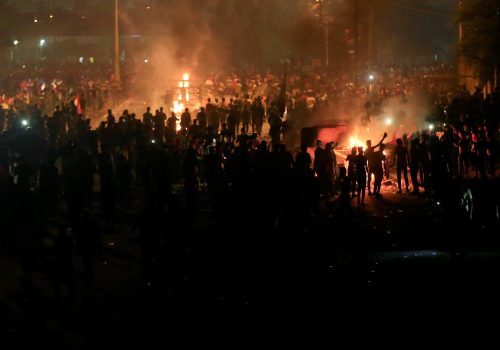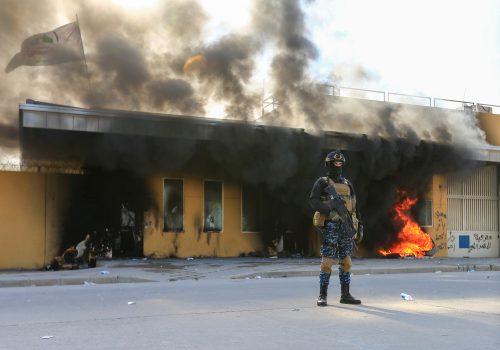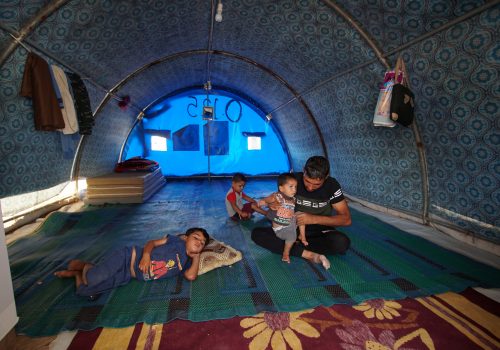Repairing Iraq’s relations with the United States
The US killing of Iranian General Qasem Soleimani near Baghdad’s international airport has strained US-Iraq ties, but it is vital for both sides to begin the long process of repairing the relationship. Partners for mutual or overlapping national security objectives, like the governments in Baghdad and Washington, need a sustained dialogue. That dialogue should begin with some high-level assurances from both sides in the coming days, but it must also be sustained by weeks if not years of serious, professional negotiations. The negotiators need endorsement from the top leadership—US Secretary of State Michael Pompeo, the Iraqi foreign minister, and the Iraqi prime minister—that their work will not be undercut abruptly. Since Iraq’s current government is a caretaker one due to recent protests that led to its resignation and there is no new government in sight, the task ahead is all the more difficult.
In the past, the US-Iraq relationship was heavily weighted towards a focus on national security matters, such as the shared fight against the Islamic State of Iraq and al-Sham (ISIS) terrorists and the equipping and training of units of the Iraqi armed forces. Other shared interests such as energy development, reconstruction, educational exchange, and the return of internally displaced persons to their homes need to be addressed. It would bolster the security part of our bilateral relations if we could start now by exploring those issues.
The State Department’s January 10 statement was in part an adept answer to reports that Prime Minister Adil Abdul-Mahdi asked the United States to send a delegation to Baghdad to begin preparing for a pull out of US troops. It concluded, “There does, however, need to be a conversation between the US and Iraqi governments not just regarding security, but about our financial, economic, and diplomatic partnership. We want to be a friend and partner to a sovereign, prosperous, and stable Iraq.” Both sides can build on this. They should want to.
The United States needs partners to share the burden of security in a part of the world which both the Obama Administration and the Trump Administration have viewed as being of declining importance to Washington’s global strategy. In recent years, better relations between Iraq and its Arab neighbors have opened the prospect for a more stable balance of power in eastern Arabia and the Persian Gulf region.
The United States needs to fashion a constructive presence in Iraq’s future after too many years when it has been perceived as an occupying military force. The American public, like the Iraqi public, does not want the United States to play the role of occupier. The invasion of Iraq cost the United States dearly in blood and treasure, not to mention the geopolitical challenges it catalyzed. The United States now wants to see a sovereign, safe, and prospering Iraq, and US support can help Iraq make strides on all those fronts. The exclusion of a future American role in Iraq is not in the interest of either Washington or Baghdad.
The current state of the volatile triangular relationship among Iran, Iraq and the United States also threatens the interests of nearby countries who are longstanding partners of the United States. Like Iraq, they do not want to be battlegrounds for a war between a global superpower and a would-be regional hegemon. In the past they have looked to Washington to formulate a strategy to deter Iran from using military force or subversion to spread its influence. They have also wanted Washington to avoid the slide to outright hostilities on unfavorable terms. Will they look for such leadership in the future? Restoring US influence will require subtle and patient diplomacy in every one of the Arab capitals, and Baghdad is a good place to begin.
Both Washington and Baghdad have assets for that dialogue, including two very capable ambassadors in their respective capitals. It is time to use the two embassies for discreet diplomacy, while avoiding public slanging between top leaders in both capitals. Both sides should seize the moment to start the hard work that lies ahead.
David Mack is a nonresident senior fellow with the Atlantic Council’s Middle East Programs. He is a former Deputy Assistant Secretary of State for Near East Affairs.
Image: Iraq's President Barham Salih meets with US Secretary of State Mike Pompeo in Baghdad (Reuters)


